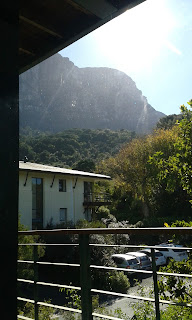 |
| Have I mentioned - I WORK HERE! |
I consider myself a conservationist but I sometimes feel a little like a fraud. What have I really done for Conservation? My research programs have had management value but not sure how much my findings have really influenced management.
I try to eat ethically and live ethically, of course I recycle and eat free range eggs, but these feel like trivial things when one is bombarded with news of coral bleaching, global climate change, rhino poaching and over fishing. Besides, living truly ethically is expensive and being a PhD student isn't exactly lucrative.
I decided at the beginning of 2014 not to eat pork (YES, BACON TOO!) This, by no means, has been easy but I have worked hard to stick to it. It was much more difficult than deciding not to eat seafood which was a decision I made when I was about 10 years old and had heard something about over fishing that decided things for me - it turns out forever.
 |
| Even when it is rainy it is still lovely |
My latest experiment in reducing my impact on the world was to stop using shampoo and conditioner and therefore decrease the amount of evil chemicals I add to the world (I have heard that they are evil chemicals, but I haven't actually done much research into it). To be honest, I hate washing my hair anyway, so this wasn't a completely selfless act. (And very low risk because if my hair looks horrible I can just wash it with shampoo).
I decided my month in Walvis Bay would be a good time to try (dolphins don't care what my hair looks like, right?). I had read (on all-knowing Internet) that you can use bicarbonate of soda mixed in water and then rinse with vinegar mixed in water as an alternative to shampoo. I couldn't find apple cider vinegar in Walvis so I just used normal white (wash windows with this stuff) vinegar. I did it once every two weeks and I promise no one said my hair looked gross. I had an independent sniff test to check for vinegar smells and that passed too. I was feeling pretty thrilled after the 6 ish weeks actually although my hair was feeling a little more knotted than usual and quite dry (JHB winter will do that to the best hair).
 |
| Check out the Green Point Park - it is lovely |
No worries, I had also read on all-knowing Internet that you can use coconut oil as a conditioner. Big tub of expensive coconut oil later, and I am set to try my hair treatment. "Work melted coconut oil thoroughly into hair and leave for two hours then wash out"... wash out? Hardly. Bicarb and vinegar made no impact on my thoroughly greasy hair. It looked terrible - rats tails. I had to shampoo multiple times and my hair didn't even seem more moisturised afterwards (good thing you can use coconut oil for cooking).
I'm trying to get back into no shampoo now so all is not lost. I am at the stage where I am wondering how much damage does shampoo really do? (I am so tempted to just finish the shampoo that is already at home). But I'm hoping that will pass because I like to think even the little things can help.
 |
| This is where I park my car for WORK! |
My next experiment might be a worm farm (composting is tricky in a second floor flat). I have always wanted one but they are so expensive and I worry the worms would die while I am away but I might have found a way to get some worms....
Let me know of you have any other eco tips (that actually work!!!)
















